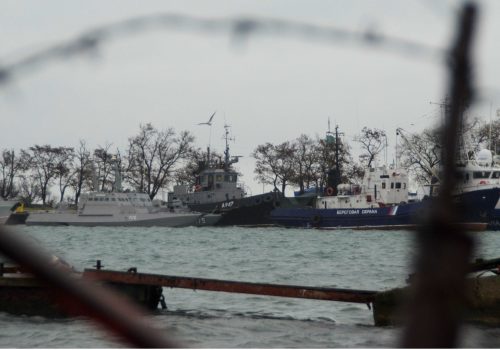Tensions between Ukraine and Russia continue to escalate as both countries have accused each other of aggressive actions after a collision between a Ukrainian Navy tugboat and a Russian Coast Guard vessel. In statements posted to Facebook, the Ukrainian Navy claimed that three of its ships were carrying out a planned relocation from Odesa to the Sea of Azov port of Mariupol when Russian vessels intercepted them. The Ukrainian tugboat was hit, resulting in damage to the ship’s engine and hull. All three vessels have now been seized by Russia. This clash follows months of rising tensions since April, when the Russian navy began to “inspect” ships going to and from Ukrainian ports in the Sea of Azov.
At this event, the Atlantic Council hosts a panel discussion, which explores the Kremlin’s current strategy in the Sea of Azov, the view from NATO, the current military situation, how Europe views the situation or why the United States is still essential in this discussion, and what the potential policy responses should be. Welcome remarks are given by Mr. Damon Wilson, Executive Vice President, Atlantic Council. The panel discussion is joined by Ambassador Daniel Fried, distinguished fellow, Future Europe Initiative, Eurasia Center, Atlantic Council; Ambassador John Herbst, director, Eurasia Center, Atlantic Council; Ambassador Alexander Vershbow, distinguished fellow, Transatlantic Security Initiative, Scowcroft Center for Strategy and Security, Atlantic Council; Dr. Celeste Wallander, president and CEO, US-Russia Foundation; and moderated by Ms. Melinda Haring, editor, UkraineAlert, Atlantic Council. Closing remarks are made by General Philip M. Breedlove, former commander of US European Command and Supreme Allied Commander Europe, NATO.
Ukraine and Russia in the Kerch Strait
The Sea of Azov
On November 25 2018, Russia seized three Ukrainian naval vessels as they were preparing to enter the Sea of Azov through the Kerch Strait. The Russian Coast Guard rammed a Ukrainian tugboat and fired on the three Ukrainian ships, injuring up to six crew members. Twenty-three Ukrainian sailors are now in Russian custody.
RELATED experts

The Eurasia Center’s mission is to promote policies that strengthen stability, democratic values, and prosperity in Eurasia, from Eastern Europe in the West to the Caucasus, Russia, and Central Asia in the East.




